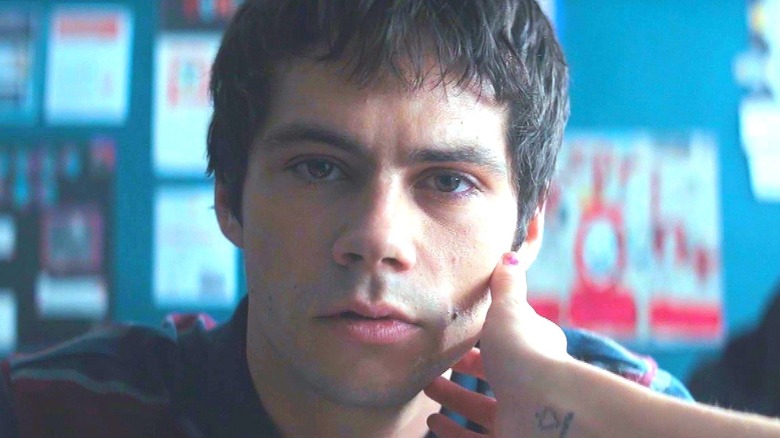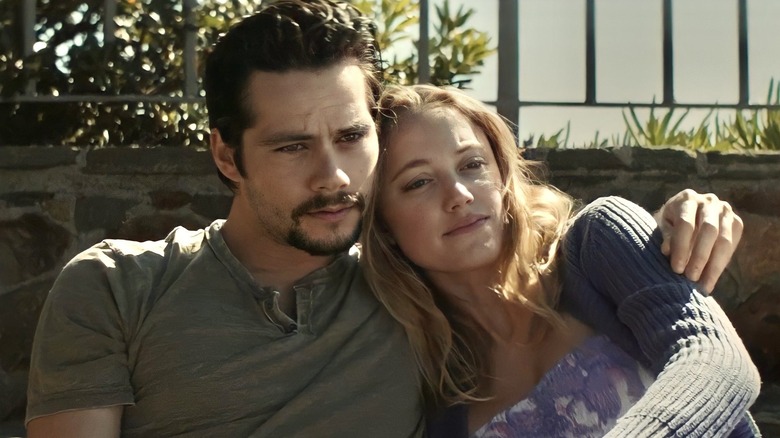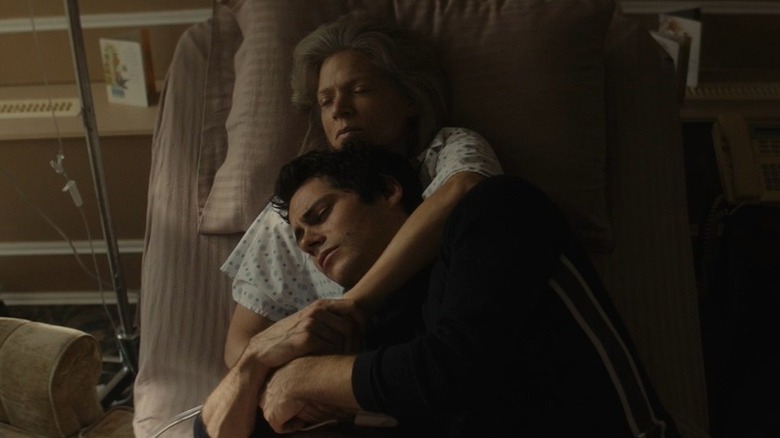The Ending Of Flashback Explained
Director and writer Christopher MacBride's time-loop film "Flashback" follows Fred Fitzell (Dylan O'Brien) as he searches for a missing girl from his past with hopes of uncovering answers about her disappearance. A mix between "The Butterfly Effect" and "Donnie Darko," the movie is a warped, trippy, and mind-altering ride that leads to broader questions about reality, the non-linear nature of time, the cumbersome task of growing up and entering adulthood, and how the choices that people make (or don't make) affect everything around them. The ending of "Flashback" left viewers puzzled, however.
At the beginning, Fred seems to have it all. He has a soon-to-be wife, Karen (Hannah Gross), a promising job, and a new apartment, but a random encounter with a squatter known as The Scarred Man from the past causes him to rethink every decision he has ever made. Fred remembers Cindy Williams (Maika Monroe), an old high school classmate and crush who vanished without a trace right before final exams. While Fred begins to unravel the mystery of Cindy's disappearance with the assistance of his friends, Sebastian and Andre (Emory Cohen and Keir Gilchrist), he is also dealing with the deterioration of his ailing mother (Liisa Repo-Martell), whose memory and communicative skills are rapidly declining.
This is the point in the movie where the popular reality-escaping drug Mercury, or "Merc," reveals itself in the narrative. Fred revisits the moment when he took the pure version of Merc with Cindy and his other high school pals, becoming entranced in alternate versions of reality. Memories of Cindy and her mysterious departure from Fred's world is juxtaposed with his dying mother and the current reality with which he grapples to know if he made the right decision or not.
How time is structured in Flashback
Time is laid out linearly in the movie and follows a straightforward unfolding of events. The perception that the film may not follow a linear storyline is the fever-like dream of back-and-forth time jumps. Initially, Fred is 30 years old, then he is back to his 17-year-old self, and then he's a young boy, and, at another point, a baby. With the help of Merc, tormented Fred comes to realize that time is not as straightforward as it seems.
A few options unfold in Fred's narrative, and in one of them, he chooses Cindy. Just after he has a freakout during a huge presentation at work, Fred (while on Merc) envisions that he and Cindy are living in a beautiful yellow house by the ocean. Fred is a painter and lives a comfortable and happy life with Cindy. In another, he and Cindy are wandering a desert. In the last reality, they are heavy users of Merc and live together in a dingy, abandoned building on Blackbird Street where Fred and his friends would go to score the drug in high school. A necklace Fred gives Cindy, that he found while digging in the trash, falls onto the floor and splits open. The shattered pieces pull him back to the memory of when he was a child and broke a special figurine that meant a lot to his mother.
Still clearly caught in the crosshairs of the past, Fred then goes to the hospital to visit his mother, where he remembers a triggering memory of falling and her yelling at him. Upon first glance, Fred's mother doesn't remember him, but just as he is about to leave, she says his name, causing Fred to become overwhelmed with emotion.
What the ending really means
His mother had only ever been trying to protect him, and instead of going back to memories of his rebellion against her and upsetting her, he thinks of happier times. This scene is indicative of Fred's repressed feelings coming out, allowing him to focus on the positives of his relationship with his mother, and not getting buried in uncomfortable parts of his past.
Realizing which reality he wants to live in, Fred gets off Merc and chooses to not follow Cindy after all, amicably parting ways with her. He gets back together with Karen and does well in the big work meeting, impressing his boss. Fred goes to the hospital to see his mother, who dies. He cries and holds her, finally ready to face the grieving process which he can't escape. Facing what frightens Fred helps him to grow up, and the reality of starting a family with Karen and being successful isn't necessarily the right or wrong choice; what matters is that he chose and is content with the outcome. Confronting the pain of death is a part of life; Fred had to leave Cindy and Merc behind in order to face his grief.
The captivating, albeit complex, ending of "Flashback" (via Screen Rant) can be interpreted in different ways and will continue to have viewers scratching their heads long after the end credits. Christopher MacBride brings an intriguing film into the sci-fi subgenre that tackles many important themes which we can use to understand our own lives. As we are presented with choices every single day in our modern world, what matters is that we choose.


